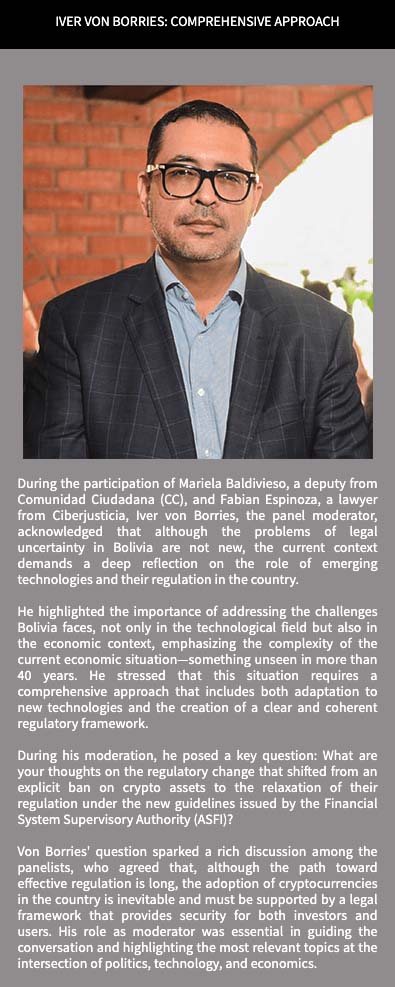One of the key points raised by Deputy Mariela Baldivieso was Bolivia’s recent removal from the “blacklist” of countries that restrict the use of cryptoassets, although she emphasized the urgency of having clear and simple regulations for their governance.
ISSUE 134 | 2024
Vesna Marinkovic U.
In the first edition of the “Bolivia Blockchain Summit 2024,” Deputy Mariela Baldivieso delivered a presentation titled **”From Prohibition to Regulation: A Bill for the Integration of Cryptocurrencies into the Bolivian Economy,”** highlighting recent advances in Bolivia’s regulatory framework and its impact on the country’s cryptocurrency ecosystem.
One of the key issues mentioned by the assembly member was Bolivia’s recent removal from the “blacklist” of countries that restrict the use of cryptoassets. “This change has opened up new opportunities for the cryptocurrency market in Bolivia, allowing the purchase and sale of cryptoassets through banks and facilitating the entry of major exchanges into the country,” she stated.
THE BLOCKCHAIN COMMUNITY
Baldivieso praised the hard work of Bolivia’s blockchain community, which has promoted educational and outreach initiatives, contributing to the development of a more open and regulated ecosystem for cryptocurrencies in the country. She also presented data reflecting the growth of cryptoasset use in Bolivia, mentioning that despite the restrictions, over 280,000 Bolivians were using cryptocurrencies in 2022, placing the country 52nd worldwide in terms of cryptoasset adoption. Although Bolivia has since dropped to 79th place, this decline is due to the rapid progress of other countries rather than a decrease in cryptoasset use in Bolivia, she clarified.
The deputy also discussed the need for a clear and simple regulatory framework that would enable the development of exchanges and encourage cryptocurrency adoption in Bolivia. According to Baldivieso, this type of regulation would not only benefit traditional economic sectors such as importers and exporters but also open up new opportunities in areas such as tourism and the tokenization of natural resources like lithium, gas, and soybeans.
IMPROVING TRANSPARENCY
Finally, Baldivieso stressed the importance of applying blockchain technology to improve transparency in public institutions, suggesting its use in areas such as elections and public resource management. According to the deputy, blockchain offers traceability, transparency, and immutability, which could help combat corruption and improve trust in the country’s institutions.
In summary, Mariela Baldivieso’s presentation at the panel organized by the “Bolivia Blockchain Summit 2024” emphasized the importance of integrating cryptocurrencies into the Bolivian economy through an innovative and favorable regulatory framework, opening new opportunities for the country in a context of growing global adoption of these technologies.

REGULATIONS MUST EVOLVE
In the same panel, Fabián Espinoza, a lawyer specializing in cyber justice, discussed both historical and contemporary aspects of cryptocurrency regulation in Bolivia. With a dynamic approach and a presentation that captured the audience’s attention, Espinoza outlined the evolution of regulations and emphasized the need for adaptation and progress in laws related to cryptocurrencies.
However, current energy supply methods are not always conducive to implementing these solutions, according to the innovators at Bactery, who cite examples such as obstructive wiring, single-use chemical batteries, and weather-dependent solar panels.
Espinoza began his presentation with a historical anecdote linking the Wright brothers’ invention of the airplane to the evolution of legal regulations. He mentioned how, in the early 20th century, landowners in the United States sued the government over the aerial invasion of their property “from the heavens to hell,” highlighting the need to modify laws to accommodate new technological developments. This example served as an introduction to his central argument: regulations must evolve, adapt, and keep pace with new technological realities, such as blockchain and cryptocurrencies.

“This, according to the lawyer, reflects an issue of lack of access to information that needs to be addressed…”
On the local front, Espinoza noted the shift Bolivia has experienced regarding cryptoasset regulation. He emphasized the importance of the recent regulation issued by the Financial System Supervisory Authority (ASFI), which lifted the ban on cryptocurrencies in the country. However, he also criticized the lack of transparency concerning the rationale behind this decision. Espinoza pointed out that despite requesting access to the reports supporting the regulation, the authorities refused to provide them, citing Article 80 of the Central Bank Law. According to the lawyer, this reflects an issue of lack of access to information that needs to be resolved for the regulation to be effective and understandable to all stakeholders involved.
Espinoza also drew attention to the statement issued by the authorities on the same day the ban was lifted, in which it was mentioned that the decision followed the recommendations of the Financial Action Task Force (FATF). However, according to Espinoza, there has been no solid legal basis to support this change, raising doubts about the coherence and clarity of public policies in this area.

MATURITY OF PUBLIC POLICIES
One of Espinoza’s most valuable contributions was his analysis of the “maturity” of the public policies that should guide cryptocurrency adoption in Bolivia. He argued that while regulation is necessary, it must be done cautiously and with a clear focus. Citing the philosopher Tacitus, Espinoza warned that “a state with too many laws is more corrupt,” emphasizing that regulation should be careful not to create more complexity than necessary.
Finally, Espinoza discussed the concept of regulation more broadly, suggesting that when discussing “regulation,” it is essential to specify what type of regulation is being referred to. He proposed the idea of visualizing regulation as a cube, where different faces represent various forms of regulation: formal, material, economic, social, administrative, judicial, and sectoral. Espinoza concluded his presentation by stressing that regulation in Bolivia must be clear, coherent, and, above all, aligned with the country’s needs and realities.
In summary, Fabián Espinoza’s intervention at the **Bolivia Blockchain Summit 2024** offered a critical and reflective view of the challenges and opportunities Bolivia faces in transitioning toward cryptocurrency regulation. His historical and contemporary analysis, along with his focus on transparency and the coherence of regulations, provided attendees with a valuable perspective on the future of cryptocurrencies in the country.

